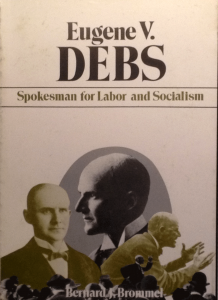Documentary Films
The Revolutionist
Alternately loved and reviled, Eugene Victor Debs was a passionate labor leader, a progressive political figure, and a formidable speaker in a time of great change in the United States. WFYI’s documentary, The Revolutionist: Eugene V. Debs, tells the story of this Hoosier’s life. Born in Terre Haute in 1855, Eugene Debs emerged as a divisive figure when he led the nationwide Pullman Strike in 1894. Seeking an alternative way for workers to gain power, he helped establish the Socialist Party in the United States and ran as its candidate for president five times. His campaign across the country drew massive crowds, and his oratory tested the limits of the First Amendment. When he spoke out against America’s involvement in World War I, the Supreme Court upheld a guilty verdict that sentenced him to ten years in prison for violating the Espionage Act. From his cell, he ran for president for the final time, garnering nearly a million votes…and sparking a national conversation about the right to free speech.
The Revolutionist: Eugene V. Debs is narrated by actor Danny Glover and is available from our Gift shop!
Eugene Debs and the American Movement
This movie is a biographical documentary about the struggle of working people during the turbulent rise of capitalism in the United States, focusing particularly on the life and struggles of Eugene Debs, a prominent late 19th and early 20th century labor leader and political activist.
This 43 minute documentary is available in 16mm and video, for rent or purchase, from Cambridge Documentary Films, PO Box 390385, Cambridge, MA 02139-0004. Phone: 617-484-3953, Fax 617-484-0754, email: cdf@shore.net, webpage http://www.shore.net/~cdf.
Books and Publications
Brommel, Bernard J., Eugene V. Debs: Spokesman for Labor and Socialism.. Chicago: Charles H Kerr Publishing Company, 1978.
Carwadine, Rev. William H., The Pullman Strike. Chicago: Charles H. Kerr and Company, 1973 (Enlarged Edition).

Constantine, J. Robert (ed), Letters of Eugene V. Debs, 3 volumes. Urbana, IL.: University of Illinois Press, 1990.
Constantine, J. Robert (ed), Gentle Rebel. (abridged edition of the 3 volume Letters) Urbana, IL.: University of Illinois Press 199
Constantine, J. Robert, “Eugene V. Debs: An American Paradox,” Monthly Labor Review, August, 1991 (Vol. 114:8), pp. 30-33. (drawn from Letters, listed separately).
Debs, Eugene V., Labor and Freedom. Project Gutenberg. September 29, 2010.
Debs, Eugene V., Walls and Bars. Chicago: Charles H. Kerr Publishing Company, 1927.
Debs, Theodore, Sidelights: Incidents in the Life of Eugene V. Debs. Terre Haute: Eugene V. Debs Foundation, 1973.
Freeberg, Ernest, Democracy’s Prisoner: Eugene V. Debs, the Great War, and the Right to Dissent. Cambridge: Harvard University Press, 2010.
Ginger, Ray, The Bending Cross: A Biography of Eugene Victor Debs. New Brunswick, N.J.: Rutgers University Press, 1949. (Reprinted by Thomas Jefferson University Press at Northeast Missouri State University, Kirkville, Missouri, 1992. The reprint edition has numerous historic photographs and an introduction by J. Robert Constantine.)
King, Charles D., “The Home of Eugene V. Debs: A Shrine to Labor and Social Reform Movements,” Labor’s Heritage, October, 1990 (Vol. 2:4), pp. 18-25.
Salvatore, Nick, Eugene V. Debs: Citizen and Socialist. Urbana, IL.: University of Illinois Press, 1982.
Schneirov, Richard, Stonequist, Shelton and Salvatore, Nick, (eds), The Pullman Strike and the Crisis of the 1890s. Urbana, IL.: University of Illinois Press, 1998.
Schnierov, Richard, “To the Ragged Edge of Anarchy: The 1894 Pullman Boycott,” Magazine of History, Spring, 1999 (Vo. 13:3), pp. 26-30.
Shannon, David A., The Socialist Party of America: A History. Chicago: 1967
Spann, Edward K., Brotherly Tomorrows: Movements For A Cooporative Society In America. New York: Columbia University
Tussey, Jean Y. (ed)., Eugene V. Debs Speaks. New York: Pathfinder Press, 1972
Vancil, David, Carter, Robert and King, Charles, “The Debs Collection at Indiana State University,” Labor History, Winter-Spring, 1990 (Vol 31:1-2), pp. 139-144.

